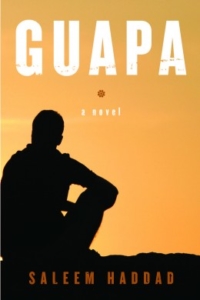 [Other Press; 2016]
[Other Press; 2016]
A lavish, five-star wedding forms the heart of Saleem Haddad’s debut novel.
This is hardly a Hollywood affair. While Guapa does have a romantic streak, the wedding is its angry opposite: the joining of two exhausted and socially pressured souls in shitty matrimony. The wedding, which links two of the protagonist’s friends, is where the story’s sweet pain comes to coalesce.
Never mind how bad things must be for the bride and groom. Our narrator, Rasa, ends up at the same table with his childhood bully. An upper-class woman whispers her banal unhappiness into his ear all evening — until he whispers back about his sexuality in a rushed, drunken confession. Other wedding guests start up a chant for the bloodstained dictator, and Rasa feels compelled to chant along.
Like at the suffocating family meal in Waguih Ghali’s seminal Beer in the Snooker Club, the protagonist ends up knocking down an insufferable, bullying prick and stumbling out.
Guapa, named for the bar where its core characters like to congregate, opens on the morning of this miserably-ever-after. Rasa is in a panic, since his grandmother has just peeped through his keyhole and caught him with his beloved boyfriend, Taymour. As the gaze pans out, we find out we’re in an unnamed Arab country in the throes of a not-entirely-specific civil conflict. On this Wedding D-day, the characters are balanced on a precipice: Will they move toward a revolution and remake the social order? Will the authoritarian regime hold things together? Or will absolutely everything come crumbling down?
Haddad’s writing is at its satiric best during the wedding itself, where he gives a sharp-tongued description of this suffocating upper-class event. Everything here grates on Rasa’s nerves, from the hotel’s security to the women’s perfumes to the colossal glass chandeliers to the uncomfortable outfits and unwanted confessions.
The icing on the cake is the high-school bully, who we’ve come to know from previous flashbacks. As a boy, Hamza policed Rasa and his friend Maj’s masculinity. Now, years later, he’s state security. When the bully saunters up, he asks, “Are we friends on Facebook? Let me friend you now.’ He reaches into his pocket and digs out his phone. Moments later there’s a ping on my phone. Hamza has requested to add you as a friend.”
But where exactly does Hamza work as state security? This is, as the jacket reports, an “unnamed Arab country,” although it’s mostly Syria. At the wedding, Hamza boasts about the president’s wife making the cover of Vogue — by which he must mean the fashion-forward and ethics-backward Asmaa al-Assad. But we’re never told we’re in Damascus, and, at times, it feels more like Cairo, with its attacks on the gay community. Or perhaps like small-town Amman.
The unnamed-ness is not uncommon in Arabic literature: Nihad Sirees’s The Silence and the Roar takes place in an unnamed Arab country, run by an unnamed dictator, which is clearly al-Assad’s Syria. But Sirees gives us enough details to feel the nature of the state crackdown. Here, we’re not sure what’s happening.
That’s partly because Rasa isn’t attuned to what’s happening. But he is a translator by trade, and he works with an American journalist who interviews a rebel leader. This should give us insight into what’s going on with the country. But in the end it’s too vague. We know the regime in this unnamed country is doing something to the “terrorists”: “On the television the news showed footage of bombs dropping on a busy neighborhood.”
Ultimately, it’s not enough. One of the book’s major weaknesses is that it telegraphs just a few details about “contemporary Arab conflicts,” conflating them all into a single jumble.
What’s much more powerful in Guapa is the private dictatorship of shame, ruled by Rasa’s grandmother, the school bullies, and everyone in the community who feels compelled to tell Rasa how a man should act. He has lived with his grandmother since his mother’s disappearance and his father’s death. Even though Rasa’s grandmother loves him, her need to avoid the community’s censure makes her not very loving. As Rasa says: “This obsession with what people will say has stripped her of her humanity.”
It’s against this backdrop that Rasa struggles to define himself. Which words are authentic for him? Is he a looti/sodomite? khawal/sissy? shaatha/queer? Is he Maj’s friend? Taymour’s lover? Once Rasa has decided what he wants, he needs to share these private meanings with others. His inability to do so makes relationships fall apart. Even if Rasa can privately define himself, words that aren’t shared with the wider community don’t have the power to hold people together.
Sprinkled throughout are moments of sweet love and friendship that stand against the dictatorship of shame. The forward action sometimes gets lost in what feels like extended HuffPo essays about identity, but Guapa shines beautifully in its moments of sweetness and satire. What’s left uncertain is where we’re going. Will Rasa, like Syria, undergo an extended internal conflict? Or will he find a way forward?
M Lynx Qualey writes for a number of publications, including The Guardian and Al Jazeera. She is also the editor of ArabLit (www.arablit.org).
This post may contain affiliate links.







